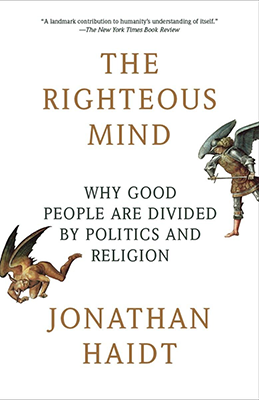
Jonathan Haidt
Jonathan Haidt is a social psychologist, author, and professor known for his research on morality, psychology, and cultural psychology. Here’s an overview of his biography:
Early Life and Education:
Jonathan Haidt was born on October 19, 1963, in New York City, USA. He attended Yale University, where he received his Bachelor of Arts degree in Philosophy in 1985. He then went on to study at the University of Pennsylvania, where he earned his Ph.D. in Psychology in 1992.
Career and Contributions:
Haidt’s academic career has been primarily focused on understanding the psychological foundations of morality and how moral values vary across cultures. He has taught at the University of Virginia since 1995, where he is currently a Thomas Cooley Professor of Ethical Leadership in the Business School.
One of Haidt’s most influential contributions is his development of Moral Foundations Theory, which proposes that there are several innate and universal psychological systems that form the basis of human moral reasoning. These moral foundations include concepts like care/harm, fairness/cheating, loyalty/betrayal, authority/subversion, and sanctity/degradation.
Haidt is also known for his work on political psychology, particularly his research into the moral foundations that underlie liberal and conservative ideologies. His findings have shed light on why people on opposite sides of the political spectrum often have difficulty understanding each other’s viewpoints.
Books and Publications:
Jonathan Haidt has authored several books that have had a significant impact both in academic circles and in public discourse:
1. The Happiness Hypothesis: Finding Modern Truth in Ancient Wisdom* (2006) – Explores the intersection of ancient philosophical wisdom and modern psychological research on happiness.
2. The Righteous Mind: Why Good People are Divided by Politics and Religion* (2012) – Presents Moral Foundations Theory and examines how moral differences contribute to political and religious divisions.
3. The Coddling of the American Mind: How Good Intentions and Bad Ideas Are Setting Up a Generation for Failure* (2018, co-authored with Greg Lukianoff) – Discusses cultural trends, such as overprotection and the concept of “safetyism,” affecting younger generations.
Impact and Recognition:
Jonathan Haidt’s work has been widely recognized and has earned him numerous awards and honors, including being named a Fellow of the American Academy of Arts and Sciences. He is also a co-founder of the Heterodox Academy, an organization dedicated to promoting viewpoint diversity and constructive disagreement in academia.
Haidt continues to be a prominent voice in discussions about morality, psychology, and the intersection of politics and psychology. His ability to bridge academic research with accessible writing has made his work influential not only in psychology but also in fields such as ethics, education, and public policy.

